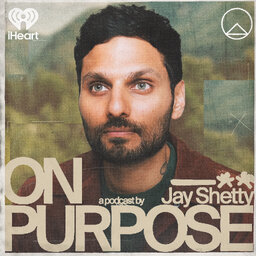7 Steps To Transform An Anxious Mindset & How To Overcome Worry Filled Thoughts
Are you often plagued by anxious and worrying thoughts, feeling uncertain about how to tackle them?
Have you recently experienced the weight of anxiety? How did it impact your day-to-day life?
Welcome to the On Purpose podcast! Today, we will embark on a discovery to master the art of working through anxiety and embracing a more serene mind.
Let's discover the power of setting intentions with your first and last thoughts of the day, the sacred practice of breathwork to shift the rhythm of your life, and the captivating world of scents and fragrances, offering transformative solace.
Moreover, there is immerse power in visualization to draw out genuine emotions and the therapeutic release through journaling to transform worries into clarity.
In this episode, you'll learn:
How anxious thoughts can impact your daily activities
The action steps to reset your mindset
How to master the flow your thoughts
The different ways to turn anxiousness into positive actions
Join us on this soul-stirring episode to nurture a tranquil and focused mind, and cultivate a sanctuary of peace and wisdom within yourself.
With Love and Gratitude,
Jay Shetty
What We Discuss:
00:00 Intro
01:22 A lot of us often have anxious and worry thoughts yet we don’t always have a gameplan to work through them
07:09 Have you recently experienced feeling anxious? What was your experience like?
09:56 Step #1: How do you need to master your first and last thought of the day?
13:49 Step #2: When you change the pace of your breath, you change the pace of your life.
18:06 Step #3: The power of scents and fragrances can transform how you feel
20:25 Step #4: Listening to one of your favorite songs or music may be a great short-term way of dealing with stress
21:32 Step #5: When you live something out in a visualization, it allows you to feel the emotions
26:04 Step #6: Get it out of your head and write it onto a page
27:21 Step #7: Read and listen about the things that you’re scared about
 On Purpose with Jay Shetty
On Purpose with Jay Shetty


